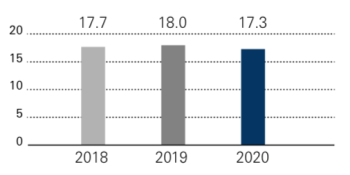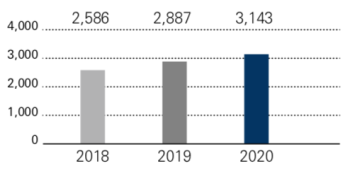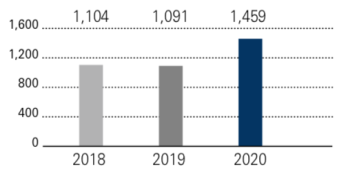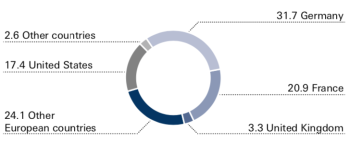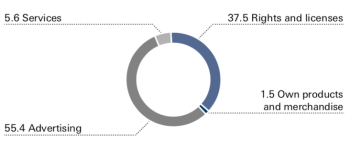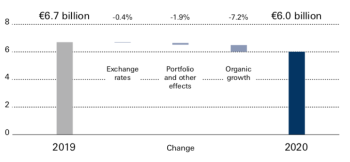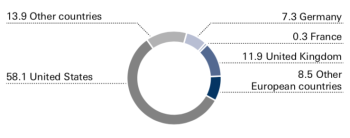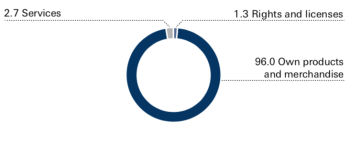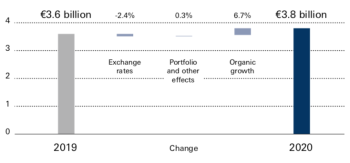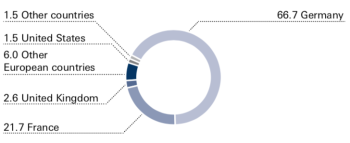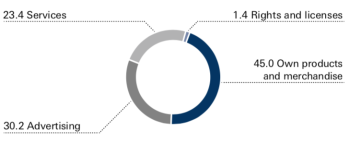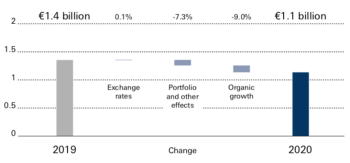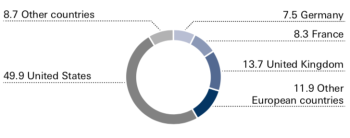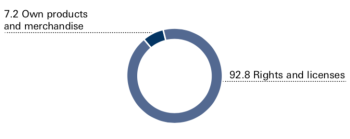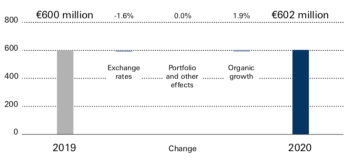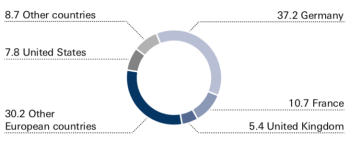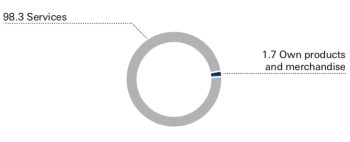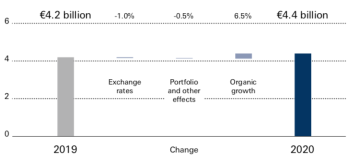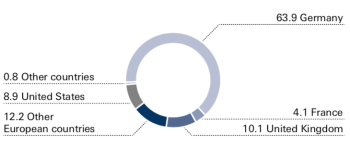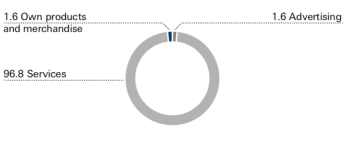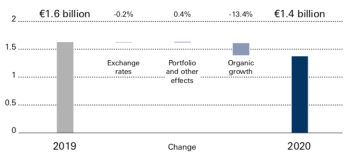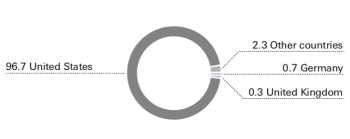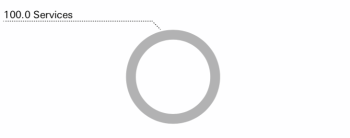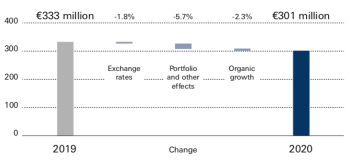Management Report
Selected chapters from the Bertelsmann Financial Statements 2020 can be found here in digital
form.
The complete Annual Report 2020 can be found
here as a PDF flip catalog.
Financial Year 2020
Financial Year 2020 in Review
Bertelsmann successfully countered the economic effects of the coronavirus pandemic in the financial year 2020, as it benefited from the quality of its business portfolio and the high proportion of revenues from digital business models. Group revenues fell by 4.1 percent to €17.3 billion (previous year: €18.0 billion), and organic revenue decreased by 1.7 percent. This revenue decline, primarily in the advertising and print businesses, was largely attributable to the pandemic, but was substantially compensated by organic growth in the book publishing and service businesses. Operating EBITDA of €3,143 million was well above the previous year’s high amount of €2,887 million, a new record. Growth in earnings was posted in particular by Penguin Random House and Arvato. Disposal proceeds from real estate transactions also boosted operating earnings. The EBITDA margin rose to 18.2 percent(previousyear:16.0 percent). In view of this positive operating business performance, Group profit increased noticeably to €1,459 million (previous year: €1,091 million). Despite the remaining uncertainties, Bertelsmann expects those businesses most strongly affected by the pandemic to continue to recover in 2021.
- Decline in revenues by 4.1 percent; organic growth at Penguin Random House, BMG, Arvato and Relias
- Coronavirus-related declines in advertising-financed and print businesses partially offset by quality of business portfolio and high proportion of revenues from digital business models
- Increase in operating EBITDA to €3,143 million, attributable to increased earnings at Penguin Random House and Arvato as well as to disposal proceeds from real estate transactions
- EBITDA margin of 18.2 percent, compared to 16.0 percent during the same period last year
- Increase in Group profit to €1,459 million
- Group profit also benefited from special items especially from disposal of investments
Performance of the Group Divisions
RTL Group
RTL Group saw a decrease in advertising bookings and postponements of productions in the financial year 2020 in the wake of the coronavirus pandemic, leading to lower revenues and operating profit. After a strong decline in TV advertising revenues in the second quarter, the situation stabilized in the third quarter; in the important fourth quarter, RTL Group’s TV advertising revenues increased again year on year.
From mid-March on, RTL Group’s management actively countered the effects of the pandemic with cost and cash flow measures, without compromising the group’s sustainable business success. More than half of the revenue losses were compensated in this way.
For the full year, RTL Group’s revenues decreased 9.5 percent to €6.0 billion (previous year: €6.7 billion), while operating EBITDA fell 22.6 percent to €1.1 billion (previous year: €1.4 billion). The EBITDA margin was 18.2 percent, compared with 21.3 percent in the previous year. At €1.1 billion (previous year: €1.1 billion), 17.5 percent (previous year: 16.1 percent) of revenues were attributable to digital businesses such as online advertising, streaming and advertising technology.
The streaming services TV Now in Germany and Videoland in the Netherlands together had 2.2 million paying subscribers at the end of the year, 52 percent more than a year earlier. In France, Groupe M6 grew the number of active users of its advertising-financed streaming service 6play to 16.3 million (previous year: 11.1 million). In October, Salto, the joint pay streaming service of Groupe TF1, France Télévisions and Groupe M6, went live. Upon launch, its offering comprised more than 10,000 hours of programming and access to content from the country’s main TV channels.
Information and entertainment offerings from Mediengruppe RTL Deutschland, Groupe M6 and RTL Nederland were met with significantly increased viewer interest during the coronavirus pandemic. The broadcasters outperformed their commercial competitors on audience ratings. In Germany, the RTL family of TV channels increased its net TV advertising market share significantly year on year.
In November, Mediengruppe RTL Deutschland and Deutsche Telekom agreed on a strategic partnership to jointly develop the growth markets of streaming and addressable TV advertising. Meanwhile, RTL Group continued to build an open ad-tech platform based on technology developed by Smartclip and tailored to the needs of European broadcasters and streaming services.
RTL Group’s content business, Fremantle, faced significant constraints in film and TV production during the coronavirus pandemic in 2020, resulting in fewer show deliveries and the postponement of productions, particularly in the second quarter. Following the introduction of protective measures, production resumed in most markets toward the middle of the year. Major creative successes included shows like “American Idol,” reality formats like “Too Hot to Handle” for Netflix, and fiction series productions such as “Deutschland 89” for Amazon Prime.
In October, RTL Group sold its majority stake in the digital video network BroadbandTV to BBTV Holdings Inc. for €102 million paid in cash. This was followed in December by the acquisition of all outstanding shares in RTL Belgium’s TV and radio business, with consideration comprising cash and treasury shares of RTL Group.
Penguin Random House
Penguin Random House benefited from strong new publications and increased demand for books in all formats in the year of the coronavirus pandemic. Despite bookstores being intermittently closed in many countries, the group grew its revenues and operating profit significantly, especially in the US and UK markets.
A strategic milestone during the financial year was the acquisition of the remaining 25 percent of the shares in Penguin Random House. The world’s largest trade publishing group has been wholly owned by Bertelsmann since April 1, 2020, at which time the German-language publishing group Verlagsgruppe Random House was integrated and renamed Penguin Random House Verlagsgruppe. In November, Bertelsmann announced the acquisition of the venerable US trade publisher Simon & Schuster. The transaction is expected to be completed in the course of 2021, once all of the necessary clearance has been obtained from the antitrust authorities.
Penguin Random House’s revenue reached €3.8 billion in the 2020 financial year, up 4.6 percent from the previous year’s level of €3.6 billion. Operating EBITDA increased by 23.3 percent to €691 million (previous year: €561 million). The EBITDA margin increased to 18.2 percent (previous year: 15.4 percent).
The top-selling book of the year was “A Promised Land,” the first volume of Barack Obama’s presidential memoirs. The book was published in November in 20 languages almost simultaneously, and sold more than 7.3 million copies worldwide across all formats through the end of the year. Penguin Random House publishers expanded its online sales in numerous markets, and established multiple virtual platforms for connecting authors, readers and booksellers. Audiobooks were again a growth driver in 2020, achieving double-digit percentage growth in most markets. Penguin Random House publishers placed numerous titles on the bestseller lists of the “New York Times” in the United States, the “Sunday Times” in the United Kingdom and “Spiegel” magazine in Germany.
In the largest book market, the United States, the top bestseller, with more than three million copies sold, was “A Promised Land” by Barack Obama. Titles such as “Untamed” by Glennon Doyle, “Becoming” by Michelle Obama, “Where the Crawdads Sing” by Delia Owens, and “How to Be an Antiracist” by Ibram X. Kendi achieved high sales figures as well.
Penguin Random House UK also had a strong year with rising revenues. The year’s most successful books included “A Promised Land” by Barack Obama, “The Boy, The Mole, The Fox and The Horse” by Charlie Mackesy, and “The Thursday Murder Club” by Richard Osman, each selling more than one million copies.
Penguin Random House Grupo Editorial saw higher online sales in Spain, offsetting significant declines in Latin America. Top-selling titles included “Las Tinieblas y el Alba” by Ken Follett, “Línea de Fuego” by Arturo Pérez Reverte and “Reina Roja” by Juan Gómez-Jurado.
In the German-speaking countries, Penguin Random House Verlagsgruppe maintained its marketplace leadership in a book market that was in decline due to the pandemic. The top-selling titles were “Ein verheißenes Land” (“A Promised Land”) by Barack Obama, “Ohne Schuld” by Charlotte Link, and “Das Kind in dir muss Heimat finden” (“The Child In You Must Find a Home”) by Stefanie Stahl.
Numerous Penguin Random House authors won prestigious awards in 2020, among them Colson Whitehead, who won the Pulitzer Prize for Fiction for “The Nickel Boys,” and Charles Yu, who won the US National Book Fiction Award for “Interior Chinatown.”
Gruner + Jahr
Following sharp pandemic-related declines in the first half of 2020, Gruner + Jahr recorded a significant improvement in advertising and distribution revenues, particularly in the fourth quarter, and successfully continued its transformation. Operating EBITDA decreased to €127 million (previous year: €157 million), and the EBITDA margin was 11.2 percent (previous year: 11.6 percent). Pandemic-related revenue shortfalls were largely offset by comprehensive countermeasures. Full-year revenues declined 16.2 percent to €1.1 billion (previous year: €1.4 billion), primarily as a result of the coronavirus pandemic and portfolio effects (including the sale of the special-interest publisher Motor Presse Stuttgart).
The revenue share attributable to the digital business in Germany and France increased once again to now 37 percent (previous year: 33 percent). The digital offerings of the magazine brands in Germany saw strong growth in revenues and earnings. In addition, the paid digital offerings, such as “Capital” and “Stern,” were expanded.
Despite coronavirus-related declines in the print advertising market and the closure of individual distribution channels (e.g., train stations, airports), G+J Germany’s earnings in its core business were only moderately lower year on year, thanks to active countermeasures. On the other hand, the magazine distribution business saw a positive development in both supermarket sales and subscriptions. Brands such as “Stern,” “Landlust” and “Schöner Wohnen” posted growing earnings. Territory, one of the leading content communication providers in Europe, also recorded mainly pandemic-related declines in sales and earnings.
G+J France posted a strong increase in earnings despite the negative impact of the coronavirus crisis on its advertising and circulation business and the insolvency of a press wholesaler. In December, G+J and Vivendi entered into exclusive sales talks for the French magazine business Prisma Media, and both companies have signed a put option. DDV Mediengruppe’s revenues and earnings were down year on year due to the coronavirus pandemic.
G+J continued to play a large and active role in the collaboration of all Bertelsmann’s content businesses in the Bertelsmann Content Alliance. 2020 saw the development and marketing of numerous new cross-divisional formats. For example, several Bertelsmann Content Alliance media covered the publication of Barack Obama’s memoirs. And UFA Show & Factual, G+J, Penguin Random House Verlagsgruppe and Audio Alliance accompanied the biggest Arctic expedition ever exclusively for the German-speaking public, achieving excellent reach with their media offerings.
BMG
Bertelsmann’s music division, BMG, kept both its revenues and its operating profit stable in the challenging financial year 2020. Thanks to the company’s focus on digital business and strong growth in music streaming, BMG was able to offset declines due to the effective shutdown of record stores worldwide. At €602 million (previous year: €600 million), revenues were on a par with the previous year, as was operating EBITDA at €137 million (previous year: €138 million). The EBITDA margin was 22.7 percent (previous year: 23.0 percent). Digital revenue sources increased their share of BMG’s total revenues to 60 percent (previous year: 56 percent).
In the recordings business, BMG releases included successful new works by Conkarah, Curtis Waters, Kontra K, KSI, Kylie Minogue and Run The Jewels. Conkarah’s hit single “Banana” scored more than one billion streams worldwide by the end of the year. Kylie Minogue’s “Disco” was her third number-one album in the United Kingdom with BMG, and Kontra K’s “Vollmond” was his fourth consecutive number-one album with BMG in Germany.
Highlights also included the reissue of “Ace of Spades” to mark the 40th anniversary of the legendary Motörhead album, and the release of the first in a new box set series “The Iconic Song,” beginning with Scorpions’ “Wind of Change.” New recording contracts were signed with, among many others, production duo Jimmy Jam & Terry Lewis, Pat Metheny, Julia Stone, Aloe Blacc, Sepultura and Erika Ender.
BMG’s publishing business saw strong performances from the likes of singer-songwriter Lewis Capaldi, AC/DC with their international number-one album “Power Up,” and The Rolling Stones, who presented their first new single in eight years with “Living in a Ghost Town.” In April, Xiao Zhan’s hit “Made to Love,” written by BMG songwriters, became the fastest-selling digital track in Chinese music history, generating 25.5 million downloads within 24 hours.
Diane Warren and Neil Finn, among others, have signed new publishing agreements with BMG. Mick Jagger and Keith Richards renewed and extended their existing contracts.
BMG made a strategic move into live entertainment by acquiring a majority stake in Undercover, an independent German concert promoter. The company also launched a boutique neighboring rights service. BMG acquired Cheyenne Records, which includes songs by the successful German girl band No Angels and other well-known artists. It also acquired all of Fleetwood Mac co-founder Mick Fleetwood’s royalties in the band’s recording catalogs, including iconic hits such as “Dreams.”
Other defining events of the financial year include the agreement of global partnerships with the British ITV Studios, a strategic content partnership with NetEase Cloud Music in China, and a cooperation agreed by BMG Production Music with the AI-based music-to-video platform MatchTune. BMG also became the exclusive partner for all musical projects of the French Ligue 1 soccer team Olympique de Marseille.
BMG further developed its fairness initiatives toward artists and songwriters. Amid the international discourse on racism, BMG launched an industry-first investigation into whether it had acquired music catalogs whose contract terms discriminate against Black artists. Initial findings and an action plan were presented at the end of the year.
Arvato
Despite the economic impact of the global coronavirus pandemic, the group’s services activities, pooled in the Arvato division, once again delivered an encouraging business performance in 2020. Besides the CRM company Majorel, the main drivers were all of Arvato’s Solution Groups. Overall, the internationally operating services group increased both its revenues and operating profit. Revenues grew by 5.0 percent to €4.4 billion (previous year: €4.2 billion), while operating EBITDA increased by 20.5 percent to €662 million (previous year: €549 million). Arvato’s EBITDA margin was 15.1 percent, compared with 13.2 percent in the previous year.
Arvato Supply Chain Solutions’ logistics services businesses continued to develop positively in the period under review, especially in the areas of e-commerce and healthcare. The Solution Group was able to increase revenues organically and win new customers, with annual revenues exceeding €100 million in key sectors. It enhanced its national and international footprint by opening new sites and expanding existing ones in Germany, the Netherlands, Poland, Turkey, the United States, China and Russia. At the same time, Arvato Supply Chain Solutions systematically and successfully advanced the automation of logistics processes as well as the individual companies’ cloud strategy and digital transformation.
Arvato Financial Solutions’ revenues and earnings also developed positively in the period under review. This was primarily supported by good business performance in the risk management and pay-after-delivery areas. The sale of 60 percent of the risk management business to the information services provider Experian was successfully completed at the end of June. In October, Arvato Financial Solutions launched an innovative platform for consumer-oriented collection management in the German-speaking countries under the Paigo umbrella brand.
In the 2020 financial year, the IT service provider Arvato Systems was able to realize various new projects with existing customers as well as win new customers in the retail, energy and media sectors. The company also further developed its business with its own products and platforms, broadened its service portfolio in the future-oriented field of artificial intelligence (AI) and significantly expanded its important cloud business both by strengthening partnerships and by increasing its in-house cloud competencies, where it achieved very high growth rates. Arvato Systems won various business awards in the period under review, underscoring both the company’s expertise and its market perception/reputation as a partner in the transformation to digital.
The CRM business unit Majorel, which is jointly operated by Bertelsmann and the Saham Group and is fully consolidated at Bertelsmann, increased its revenues and earnings in the 2020 financial year. Internationally, business with customers from the IT and high-tech sectors, among others, was expanded and an innovative communications project for a customer from the automotive industry in Germany was successfully implemented. Majorel also supported health authorities and public-sector institutions in Germany and Morocco in dealing with the coronavirus pandemic, established a new global consulting unit and acquired the French digital services provider Isilis.
Bertelsmann Printing Group
The internationally operating printing and marketing services provider Bertelsmann Printing Group (BPG) recorded a decline in revenues and operating profit in the 2020 financial year. The reason for this development was the continued challenging situation in the European print markets, which worsened again in the context of the coronavirus pandemic. The catalog and magazine segments, in particular, came under considerable pressure during the year; numerous orders were canceled on short notice, and others were reduced in size. Group revenues declined by 13.2 percent year on year to €1.4 billion (previous year: €1.6 billion). Operating EBITDA decreased by 19.8 percent to €55 million (previous year: €68 million). The EBITDA margin was 4.0 percent (previous year: 4.4 percent).
The group’s printing businesses in Germany, Switzerland and Austria also registered declines due to the pandemic in 2020. Europe’s leading offset printing company, Mohn Media, was only slightly down from the level of the prior-year period overall, as lower capacity utilization, particularly in the catalog and magazine segments, was largely offset by the further expansion of the brochure business and cost-cutting measures. Prinovis Germany once again experienced a significant decline in the period under review, mainly due to the planned capacity reduction at the Nuremberg site, which is to be closed, but also due to the difficult situation in the magazine segment. In contrast, GGP Media, which focuses on print solutions for book publishers, was able to extend important production contracts with major customers over the long term, gain market share and grow profitably in the financial year, bucking the market trend.
The direct marketing businesses in the German-speaking area recorded a slight decline in revenues. Dialog’s multichannel marketing businesses and Campaign’s campaign management services came under pressure due to the fact that advertising companies cut their marketing budgets, especially in the first few months of the pandemic. Meanwhile, the DeutschlandCard multipartner rewards program was able to profitably expand its business and grow for the fifth year running. In addition, the contracts with its three largest partners were extended long term.
The group’s printing activities in the United Kingdom were also hard hit by the economic consequences of the pandemic. Revenues and earnings declined sharply as a result of volume reductions, particularly in periodic supplements. Comprehensive countermeasures to adjust capacity made it possible to absorb part of these losses. The printing businesses in the United States stabilized after a weak first half, but overall fell short of the previous year’s figures in revenues and operating profit. At the beginning of November, BPG USA acquired two book production sites from a competitor, thereby securing the long-term production needs of its major publishing customers in the United States. At almost the same time, long-term contracts were concluded with two other major publishing houses.
Revenues at the storage media manufacturer Sonopress decreased against the backdrop of a market that continued in significant decline, but yet performed better than expected. The Topac packaging printing company, which is part of the Sonopress Group, further expanded its business with sustainable packaging solutions for the food industry.
Bertelsmann Education Group
The Group’s education businesses, which are pooled in the Bertelsmann Education Group, recorded an increase in revenues in the 2020 financial year, excluding businesses sold during the period under review. Operating income also increased. The coronavirus pandemic accelerated the shift from classroom-based to online learning, which benefited the e-learning provider Relias, the online learning platform Udacity and Alliant International University. The Bertelsmann Education Group stepped up its investments in new products and technologies in 2020, laying the foundations for long-term growth.
The division generated total revenues of €301 million, down 9.8 percent from the previous year (€333 million). In 2019, a part of the continuing education provider OnCourse, acquired earlier, was sold, followed in 2020 by the majority of the operating business of the US university service provider HotChalk. The Bertelsmann Education Group’s operating EBITDA came to €89 million, putting it 5.6 percent above the previous year’s result of €84 million. The EBITDA margin increased to 29.5 percent (previous year: 25.2 percent).
The online courses offered by Relias were in particularly high demand in 2020 and led to organic growth. Relias offered healthcare professionals across the globe COVID-19 prevention courses free of charge, as its contribution to combating the coronavirus pandemic. Relias also invested in cloud-based applications and a virtual classroom that makes it easier for the company’s more than 11,000 institutional clients to conduct healthcare training online and in hybrid learning formats.
Udacity, the online learning platform in which Bertelsmann has a significant stake, launched new courses, such as Nanodegree programs in Artificial Intelligence in Healthcare, and training to become an AWS Cloud Architect or a Data Architect. At the same time, the platform saw strong demand from corporate customers seeking to offer their workforces online training to prepare for the changes resulting from digitization. In response to the coronavirus pandemic, Udacity launched an extensive scholarship program and in March offered free courses to gain digital skills and to open up new opportunities for job seekers.
Alliant International University, which specializes in psychology and education, kept revenues stable and expanded its share of online enrollments further. Alliant’s online segment now accounts for more than a third of total revenues.
As part of its three-year #50000Chances program to remedy the shortage of IT specialists, Bertelsmann again offered 15,000 scholarships for Udacity courses in the areas of cloud, data and AI during the year under review. In response, more than 60,000 applications were received from 188 countries.
Bertelsmann Investments
In 2020, Bertelsmann Investments (BI) expanded its network of start-ups and funds to around 260 active investments, with a total of 44 new and 24 follow-on investments, and realized several exits. Due to currency effects and pandemic-related devaluations in the portfolio held, EBIT was €1 million (previous year: €107 million).
Bertelsmann Asia Investments (BAI) remained the most active fund in the financial year 2020, making 24 new investments, including in JoJo, an online provider of AI-assisted courses for children. This investment has strengthened BAI’s footprint in the fast-growing online education sector. BAI also invested in PingCap, a next-generation open-source and cloud-native database.
In addition, the fund expanded its focus to the drug development market with investments in two AI-empowered pharma tech companies: Galixir applies AI to increase the success rate of drug development, and NeoX is an AI-supported biopharma company focused on finding new macromolecular therapeutics to treat cancer and other difficult-to-treat diseases.
BAI made follow-on investments in 11 companies, including Tomato Mart, an online and offline fresh food retailer, and Keep, an online fitness and community app founded in 2014. BAI’s 2020 disposals included its entire stake in iClick, an online digital marketing tool, and a partial exit from Chinese electronics manufacturer Xiaomi, which became the world’s third-largest smartphone producer in Q3 2020.
Bertelsmann India Investments (BII) focused on strengthening its portfolio with follow-on investments in eight portfolio companies, among them Shiprocket, which helps small businesses manage and track their end-to-end logistics processes; the B2B logistics solutions provider LetsTransport; and Licious, a D2C food platform for non-vegetarian products. After a successful partial exit from Eruditus, BII continues to hold a stake in the successful executive education company.
Bertelsmann Brazil Investments (BBI) recorded further M&A activity at the indirect holding Afya, the largest university group in Brazil focused on medical education. Afya now owns the SaaS company iClinic and MedPhone, an app that supports medical professionals in making faster and more accurate decisions.
Bertelsmann Digital Media Investments (BDMI) made 14 new investments, including in the customer-journey software Zephr and subscription-based video platform Hellosaurus, as well as several follow-on investments. One of the highlights was the IPO of the online advertising software PubMatic. BDMI recorded additional successful exits with the sale of the portfolio company Skimlinks to Connexity, and the sale of its stakes in SensorTower and Radish.
Bertelsmann Investments also invested in six funds, including the fund of the Berlin-based venture capital firm Greenfield One and the fund Vertex Ventures IV, which operates in Southeast Asia and India.
Combined Non-Financial Statement
The following information relates to Bertelsmann SE & Co. KGaA and the Bertelsmann Group (“Bertelsmann”) with its incorporated, fully consolidated subsidiaries (“subsidiaries”) in accordance with sections 315b and 315c of the HGB, in conjunction with sections 289b to 289e of the HGB.
Bertelsmann operates in the core business fields of media, services and education in around 50 countries (see the section “Company Profile"). Taking responsibility – for employees, society, the business environment and the natural environment – is firmly anchored in Bertelsmann’s corporate culture. In its corporate responsibility management, Bertelsmann pursues the goal of reconciling commercial interests with social and environmental concerns, within the Group and beyond.
When preparing its combined non-financial statement, Bertelsmann follows the Standards (2016) of the Global Reporting Initiative (102 and 103). In addition, voluntary reporting based on the GRI Standards (2016; in accordance: Core option) is published in the middle of the financial year.
Company Principles and Guidelines
The prerequisites for a corporate culture in which employees, management and shareholders work together successfully, respectfully and in a spirit of trust are common goals and shared values. These are set forth in the corporate constitution as well as in the Bertelsmann Essentials “Creativity and Entrepreneurship.” Furthermore, the Bertelsmann Code of Conduct – as a binding guideline – defines minimum standards for ethical and lawful conduct within the company and toward business partners and the public. The Bertelsmann Supplier Code of Conduct sets out the mandatory minimum requirements for its business partners in their relationship with Bertelsmann.
Bertelsmann’s actions are also determined by external guidelines. The company uses as guidance the recommendations of the German Corporate Governance Code for good and responsible corporate governance and largely follows the OECD Guidelines for Multinational Enterprises. Bertelsmann is committed to the principles of the Universal Declaration of Human Rights, the United Nations Guiding Principles on Business and Human Rights, and the International Labor Organization core labor standards. A member of the United Nations Global Compact, Bertelsmann supports the Agenda 2030 of the UN.
Corporate Responsibility Management
Organization
The advisory body for the strategic development of corporate responsibility (CR) at Bertelsmann is the CR Council. The CR Council is made up of high-ranking managers from the corporate divisions and the Chief Human Resources Officer of Bertelsmann, who chairs the advisory body. The CR Council focuses on Group-wide CR topics in line with the corporate strategy, anchoring CR more strongly in the corporate divisions and the cross-divisional coordination of CR activities within the Group.
At the Group level, the Corporate Responsibility department coordinates and supports the work of the CR Council in close cooperation with the other Group functions. Within the Bertelsmann corporate structure, the local management teams are responsible for implementing corporate responsibility through specific measures and projects. The corporate divisions and companies have their own structures and processes in place for this, in accordance with local requirements.
Topics
To identify key CR topics, Bertelsmann carries out regular CR relevance analyses. For each analysis, the company conducts a survey of internal and external stakeholders; the external stakeholders estimate the impact of Bertelsmann’s business activity on the CR topics, while the internal stakeholders assess their business relevance. This process serves to identify CR topics that are necessary for understanding the business development, the business performance, the position of the Group and the impact of its activity on the non-financial aspects, which include employee and social matters, respect for human rights, anti-corruption and bribery matters as well as environmental matters. These topics are analyzed within the company boundaries, unless otherwise stated. In 2020, the Bertelsmann Executive Board confirmed the validity of the current CR relevance matrix.
CR topics, including non-financial performance indicators, are increasingly important for Bertelsmann’s businesses, but have not yet been incorporated into the value-oriented management system. Due to currently limited measurability, no directly quantifiable statements can be made regarding relevant interdependencies and value increases for the Group. For this reason, the non-financial performance indicators are not used for the management of the Group (see the section “Value-Oriented Management System”).
Risks
A number of risks associated with CR topics are relevant for Bertelsmann. These risks can arise from the company’s own business activities or from its business relationships, and can affect the company or its environment and stakeholders.
For the non-financial matters defined in the German Commercial Code – employee and social matters, anti-corruption and bribery matters, respect for human rights and environmental matters – no significant risks were identifiable as part of the 2020 reporting. For more information on the relevant risks, please see the section “Risks and Opportunities”.
Employee Matters
Motivated employees are key to creativity, innovation and continued business success. This corporate identity – anchored in the corporate constitution and Bertelsmann Essentials – is the basis for the Executive Board guidelines on HR work. Supplementary regulations are specified in the Bertelsmann Code of Conduct. The Chief Human Resources Officer (CHRO) of Bertelsmann is primarily responsible for dealing with employee matters within the company. The main focus of his work throughout the Group includes setting the strategic HR agenda, aligning management development with the Group’s strategic priorities, Bertelsmann University, standardizing and providing IT support for important HR processes, developing the corporate culture and implementing corporate responsibility in the Group.
The CHRO heads the HR Committee, which is the corporate committee responsible for international HR matters at Bertelsmann. Its members are the heads of HR at the corporate divisions who have a functional reporting line to the CHRO, as well as head managers of the corporate HR department.
Participation
Continual dialogue between employees and company management at Bertelsmann is a key element of Bertelsmann’s corporate culture. The goal of participation is to involve employees in the continued development of the company and to gain their perspective on fundamental decisions in regard to company policy.
Although Bertelsmann, as a media company, is free to determine its political direction as defined in the German Works Constitutions Act (Tendenzschutz) and therefore is not subject to statutory co-determination in the Supervisory Board, the company nevertheless makes four positions on the Supervisory Board of Bertelsmann SE & Co. KGaA available to employees on a voluntary basis. Three of these are leading works council members of German Group companies and one is a member of the Bertelsmann Management Representative Committee, currently vacant. In addition, managers, general workforce, employees with disabilities and trainees all have platforms for exchanging ideas, advancing topics and voicing their concerns. The Bertelsmann Group Dialogue Conference is an event where the CEO, CHRO and members of the Corporate Works Council from the Group divisions in Germany can exchange ideas. In 2020, this led to intensive collaboration and cross-divisional communication beyond the scope of the committees required by law, for example to tackle challenges posed by the coronavirus pandemic and to initiate projects such as a Bertelsmann platform for cooperating on IT matters. The same applies to representatives for employees with disabilities in the Group for implementing the Inclusion Action Plan in the German Bertelsmann companies. Employees are also involved in the development and improvement of working conditions through standardized HR interview tools (Performance and Development Dialogue, Agreements on Objectives, Team Talk), as well as international employee surveys. In 2020, numerous pulse surveys were conducted in the divisions and among top executives in response to the coronavirus pandemic. In addition, the frequency of the international Employee Survey was shortened to two years.
Learning
Highly qualified employees are needed to address major changes such as the Group’s increasingly international focus, the digital transformation of media and services, and demographic change. Bertelsmann University aims to assist employees with their performance by providing opportunities for lifelong learning, and thus contribute to their long-term employability. With four campuses – Strategy, Leadership, Function and Individual – Bertelsmann University is the central learning organization Group-wide.
In response to the global coronavirus pandemic, Bertelsmann University suspended all in-person classes as of March 2020 and moved online the international program in the areas of Strategy, Leadership and Transformation. In the process of developing digital courses focused on technology competency, new course curricula were introduced in the areas of data, the cloud and artificial intelligence. Furthermore, the three-year Udacity scholarship program was continued for a second year, providing 50,000 scholarships for which both employees and external candidates are eligible to apply. Additional initiatives with an emphasis on strengthening the company’s learning culture and social learning included the “Kollegen-Campus” (“Campus of Colleagues”), a digital and international initiative for peer-to-peer learning. In Germany, the Bertelsmann training and studies courses were also adjusted to accommodate the changes caused by the coronavirus pandemic by using adapted learning environments and an increasing number of digital work methods.
Diversity
The diversity and differences in the workforce are prerequisites for creativity, innovation and Bertelsmann’s long-term business success. This is conveyed in the Bertelsmann Essentials. Furthermore, the Bertelsmann Executive Board emphasizes in its Diversity Statement its aim of increasing diversity of staff at all levels and in every respect. The diversity strategy is implemented by the Corporate Responsibility department, with support from a Group-wide working group. The focus in 2020 was on the following dimensions: gender, disabilities as well as sexual orientation and identity. Some divisions set their own additional priorities to reflect the local situation. The Bertelsmann website provides an overview of the measures used for increasing diversity at Bertelsmann under the link www.bertelsmann.com/diversity.
On December 31, 2020, the genders were almost evenly distributed across the entire staff, with 54 percent women (previous year: 53 percent) and 46 percent men (previous year: 47 percent). The Group Management Committee (GMC), which advises the Bertelsmann Executive Board on important corporate strategy and development matters, as well as other issues that affect the Group as a whole, comprised 18 members (previous year: 16), of which six were female (previous year: six) as of December 31, 2020. To enhance diversity at the management levels, Bertelsmann aims to achieve the goal of one-third of positions in top and senior management across all divisions being occupied by women by the end of 2021. To fulfil this goal, the targeted proportion of women in the talent pools was set at one-third for the top and senior management pool and 50 percent for the career development pool. These targets were already met in 2019/2020. The proportion of women in top management was increased. The Bertelsmann Supervisory Board is notified annually of the progress in regard to these targets.
The Bertelsmann Inclusion Action Plan 2019-2024 aims to form processes and structures in the German companies to maximize accessibility for employees with disabilities so they may contribute their full potential to the company’s success. The first evaluation of the measures implemented was carried out after one year as planned and is available at the Bertelsmann website under www.bertelsmann.com/disability-and-inclusion. The be.queer LGBTIQ employee network, launched in 2017, continued its activities in 2020 and actively assisted in linking the LGBTIQ networks in the divisions. Furthermore, various measures were implemented in the divisions again in 2020, especially as a response to the Black Lives Matter movement.
Targeted Proportion of Women in Top and Senior Management
| Target for 2021 | in percent | 2020 | 2019 | ||
|---|---|---|---|---|---|
| One-third of positions across all divisions occupied by women |
Top management1), 2) | 27 | 22 | ||
| Senior management1), 3) | 30 | 30 | |||
Health
With a view to designing a health-promoting work environment and preventing work-related risks of disease, Bertelsmann is continually expanding the company health management system at German locations. Bertelsmann Health Management develops and takes responsibility for the Bertelsmann health strategy in cooperation with a cross-functional strategy group. The head of HR Coordination and Shared Services chairs this group and directs implementation of the health strategy. This individual is assisted by the cross-divisional “Health Community,” which is comprised of employees in areas of health and human resources, works council members and representatives for employees with disabilities and works on topics such as “Minimum Health Standards.” Health representatives in the German companies assist in locally implementing Health Management in business operations. The internal Health Management Consulting provides advising services and support.
Due to the coronavirus pandemic, the focus of management in 2020 was on immediately protecting the health of all employees all over the globe. This included setting up centralized and local crisis teams to develop and implement prevention and protection measures in accordance with statutory regulations. The most important measure was helping employees Group-wide to work from home wherever this was compatible with operational considerations. Additional initiatives included organizing and supplying masks and disinfectants, creating in-house (PCR) testing facilities and preparing and implementing plans for employees’ return to the workplace, including the necessary organizational adjustments. All of these measures were accompanied by numerous support programs for maintaining mental and physical health as well as extensive communication activities.
Furthermore, in 2020 the German companies were informed of the findings of the third status report on “Minimum Health Standards” carried out in Germany as well as the health recommendations based on the international employee survey (2019). Most of the companies are actively implementing the minimum standards, thereby already establishing the basic foundations for Health Management. In addition, the companies were provided with a toolbox for assessing the risk of psychological stress to assist them in complying with statutory requirements.
Fair Working Conditions
Strategy implementation and operational responsibility are for the most part delegated to the divisions and companies, in accordance with the subsidiarity principle. This also includes ensuring fair working conditions as well as safety and health at the workplace, which are integral elements of the corporate culture. It is Bertelsmann’s goal to implement this. The Supplier Code of Conduct contains standards for Bertelsmann’s business partners stipulating that they adhere to the statutory regulations on fair working conditions and allow their employees to speak up freely and without fear of retaliation.
At Bertelsmann, remuneration issues are an essential part of fair working conditions. The design of the compensation system is intended to ensure that remuneration is driven by market, function and performance considerations, taking into account business-specific characteristics. Profit sharing at Bertelsmann and many of its subsidiaries in Germany is based on the same criteria as those used to calculate variable remuneration components for Executive Board members and executives. A number of additional subsidiaries in Germany and abroad have similar success and employee-profit-sharing models adapted to local requirements. In 2020, a total of €100 million of the 2019 profit was distributed as part of such schemes. Other aspects of the topic “Fair Working Conditions,” such as human rights, health, continuing education and anti-discrimination are discussed elsewhere in this non-financial statement. The international Employee Survey, last conducted in 2019, also asks respondents for their sentiment on issues related to fair working conditions.
Social Matters
Creative Independence
Creativity is one of the two company values at Bertelsmann. Free and critical thinking as well as exchange of varying opinions form the basis of the company’s canon of values. Bertelsmann stands for editorial and journalistic independence in its content businesses, as well as for freedom of the press and artistic license. Bertelsmann publishes a wide variety of opinions and positions. These basic principles for business activities are also set forth in the Bertelsmann Code of Conduct. Bertelsmann aims to ensure this independence in two directions. Inside the company, it means that our management does not attempt to influence the decisions of artists, authors, editors and program managers, or to restrict their artistic or editorial freedom. To the outside, this means that both content managers and company managers comply with existing laws regarding the separation of editorial content and commercial advertising and do not capitulate to political or economic influence in their coverage. In accordance with the Bertelsmann “Editor-in-Chief Principle,” editorial decisions are the sole responsibility of the content managers. 2020 saw a continuation of a variety of organizational measures to safeguard editorial and artistic independence at the editorial and creative departments. Here the focus is primarily on complying with the “Editor-in-Chief Principle,” duties of care, respect for privacy, and dealing with the representation of violence and the protection of minors.
Content Responsibility
Content responsibility at Bertelsmann means reflecting on the repercussions of the content it produces and distributes, to protect the rights and interests of media users, customers and third parties as far as possible. Overriding principles and guidelines of media ethics are set by national and international laws governing the press, broadcasting and multimedia; by voluntary commitments to external guidelines such as the ethics codes of national press councils; and within the company by the Bertelsmann Code of Conduct. In accordance with these principles and guidelines, Bertelsmann’s editorial staff are committed to, among other things, “respecting privacy and the responsible treatment of information, opinion and images.” As a result, the company expects careful research, qualitative reporting and transparency in case of errors. Thorough journalistic skills are more important than ever in the face of online disinformation. Furthermore, the issue of content responsibility is anchored in various ways in the divisions, companies and editorial departments. In accordance with the “Editor-in-Chief Principle,” the responsibility for media content lies solely with the managers in the editorial teams and creative departments. Cross-division verification teams continued in 2020 to provide their expertise in discerning between authentic and manipulated photos and videos, or those taken out of context.
In the area of youth media protection, content is monitored in accordance with different restrictions for each medium and region to see if it could adversely affect the development of children or young people. If there are indications of such, various restrictions come into force, such as broadcasting time restrictions or content and/or product labels. Through voluntary labeling systems, Bertelsmann divisions and companies sometimes go beyond the existing EU and national regulations, particularly in the area of audiovisual media. In addition, Bertelsmann companies are active in child and youth media protection organizations.
Customer Data Protection
Bertelsmann attaches great importance to protecting customer data. This includes safeguarding the personal data of company customers, as well as personal data provided to Bertelsmann by its business partners regarding their customers. The goal of customer data protection is to protect an individual’s right to determine who has what knowledge about the individual, and when. This also means that personal information, or information that could identify a person, must be handled in accordance with the legal requirements and adequately protected against unauthorized access and that the data subjects must be able to claim their statutory rights. There are various possibilities for data subjects to contact Bertelsmann, including e-mail addresses set up for this purpose. In addition to the Bertelsmann Code of Conduct, customer data protection within the company is regulated by Executive Board guidelines on the topics of information security and IT risk management.
The Executive Board Guideline on Data Protection reflects the basic legal data protection framework at Bertelsmann Group based on the European Union’s General Data Protection Regulation (GDPR), and is designed to ensure consistent data protection management across the Bertelsmann Group. A Group-wide data protection management system addresses in particular the implementation of the documentation and accountability obligations under GDPR.
Responsibility for customer data protection rests with the management of the individual subsidiaries. To ensure compliance with data protection laws, the subsidiaries in Germany have a data protection organization consisting of central data protection officers and local data protection coordinators. The latter report to the local management, as well as annually or on an event-driven basis to the central data protection officers, who in turn report annually or on an event-driven basis to the Bertelsmann Executive Board. A similar organization exists in subsidiaries outside Germany. An Information Security Management System (ISMS) based on industry-standard ISO 27001 creates the technical and organizational framework for confidential data processing. The ISMS features a regular and structured survey of relevant processes and procedures, to ensure compliance with statutory information security requirements, a systematic recording of risks and derivation, and control of related mitigation measures.
Protecting Intellectual Property
Bertelsmann’s businesses also develop, produce, finance, transfer, license and sell products and services that are protected as intellectual property. For Bertelsmann, the protection of intellectual property rights is of particular importance for its analog and digital business. This is also set forth in the Bertelsmann Code of Conduct: “We respect and protect all forms of intellectual property and protected content.” For this reason, the company is committed to the highest possible level of global copyright protection worldwide, as well as maintaining strong exclusive rights and freedom of contract – and in the same measure, also to balanced legal conditions that allow for fair competition in the digital market. The Taskforce Copyright, with representatives from the relevant German content businesses (Mediengruppe RTL Deutschland, Penguin Random House Verlagsgruppe, G+J, BMG and UFA), monitor current developments and legislative processes in EU and German copyright law and develop joint positions. The focus in 2020 was the transposition of the EU copyright directive in the digital single market into German law.
Respect for Human Rights
Through its Code Conduct and its voluntary commitment to external guidelines, Bertelsmann is committed to respecting and protecting human rights within the company and in its business relationships. The goal is to minimize the risk of human rights violations and discrimination to the greatest possible extent. For this reason, the Bertelsmann Executive Board established an Integrity & Compliance program and appointed a Corporate Compliance Committee (CCC). The CCC submits an annual Compliance Report to the Bertelsmann Executive Board and the Audit and Finance Committee. The CCC chair is the head of the Corporate Legal Department. The Integrity & Compliance (I&C) department is responsible for implementing the topic, and is subordinated to the CCC in the organization. I&C supports the CCC in fulfilling its tasks and makes suggestions for necessary improvements to the I&C program. I&C ensures that employees worldwide are made aware of the key legal provisions and internal company guidelines, including those concerning respect for human rights. I&C continued its Code of Conduct training sessions in 2020 and took communication measures that included the topic “Respect for Human Rights.”
Respect for human rights within the supply chain is also expressly stipulated by the Bertelsmann Code of Conduct and the Supplier Code of Conduct. This includes a ban on child and coercive labor and a ban on discrimination and intimidation, and it reaffirms the right to freedom of association and the right to engage in collective bargaining.
In addition, in 2020 individual subsidiaries and Bertelsmann itself issued statements for 2019 in accordance with the “UK Modern Slavery Act” that condemn all forms of modern slavery, coercive and child labor, and exploitation and discrimination, and present measures to prevent these human rights violations. These statements are revised each year (if required). Infringements of these principles can be reported by Bertelsmann employees and third parties by using the existing compliance management systems.
In terms of anti-discrimination, contact persons for Germany’s “General Equal Treatment Act” (AGG) have been appointed at German locations. Employees can contact them in the event of suspected breaches of said act. The employees are informed of their rights under the AGG and given corresponding training through a wide range of communication channels. The topic of anti-discrimination was addressed Group-wide as part of Code of Conduct training sessions to build employee awareness of the issue and advise them of their rights. These and other international activities are being continually refined and expanded. Regarding business partners, the Supplier Code of Conduct stipulates that they provide a workplace environment that does not allow for discrimination. The Supplier Code of Conduct also stipulates that Bertelsmann’s business partners do not tolerate discrimination against employees or applicants for employment because of any characteristic specified under applicable antidiscrimination law or company policy.
The findings of the Bertelsmann Compliance Risk Analysis of 2020 show that the risks of human rights violations and discrimination are minimized to the greatest extent possible in view of the measures that have been taken.
Anti-Corruption and Bribery Matters
Bertelsmann actively combats corruption. As a participant in the United Nations Global Compact, Bertelsmann is committed to taking a stance against all types of corruption, among other things. A key priority of the Bertelsmann Executive Board is to effectively counteract corruption within the company. The goal is to reduce the risk of corruption to a level at which it does not endanger the company’s success. Both the Bertelsmann Code of Conduct and the Executive Board Guideline on anti-corruption and integrity expressly prohibit all forms of corruption and bribery. This prohibition also applies to all third parties that work for, with or on behalf of Bertelsmann, as stipulated in the Supplier Code of Conduct. Along with instructions for dealing with officials, and guidelines for the granting or accepting of gifts in the context of business relations, the Anti-Corruption and Integrity Guideline prescribes appropriate due diligence processes in dealing with third parties. An appropriate due diligence review is carried out for each individual risk profile through a corresponding risk classification. This Executive Board guideline also describes the channels for reporting suspected violations (especially with the help of an internet-based reporting system) and seeking advice, as well as other prevention and control measures. The Executive Board guideline for dealing with alleged compliance violations anchors an obligation to report suspected violations of the prohibition of corruption to the Bertelsmann Corporate Center. The risk of corruption is addressed in the annual compliance report submitted to the Executive Board. Relevant employees across the Group take part in the online course “Anti-Corruption & Integrity.” The I&C department, reporting to the Corporate Compliance Committee (CCC: see the section on “Respect for Human Rights”), manages and develops corruption prevention measures in the Group. The most important measures in 2020 include reviewing and voting on a new Code of Conduct as well as designing a new Code of Conduct training program to be rolled out in 2021. The findings of the Bertelsmann Compliance Risk Analysis of 2020 show that the risk of corruption is minimized to the greatest extent possible in view of the measures taken.
Fair Competition and Antitrust Law
Bertelsmann is committed to the principle of fair competition, and condemns antitrust violations and anticompetitive behavior. The goal is to reduce the risk of antitrust violations to a level at which they do not endanger the company’s success. The Bertelsmann Executive Board issued the Group Guideline for Compliance with Antitrust Regulations to anchor a reporting requirement for antitrust violations. With regard to the supply chain, the Supplier Code Conduct obligates Bertelsmann’s business partners to observe the applicable antitrust and competition law. Infringements of antitrust provisions can be reported by Bertelsmann employees and third parties by using the reporting channels of the existing compliance management system. The company acts against any contravention that becomes known, and consults internal or external experts on antitrust and competition issues. The topic of competition and anti- trust law is addressed in the annual Compliance Report submitted to the Executive Board. The Corporate Legal Department provides an obligatory antitrust training program to corporate divisions and the management and employees of these divisions who work in antitrust-related areas. This training program moved to a virtual format in April 2020 due to the coronavirus pandemic. The findings of the Bertelsmann Compliance Risk Analysis of 2020 show that the risk of antitrust violations is minimized to the greatest extent possible in view of the measures taken.
Environmental Matters
Bertelsmann aspires to become climate-neutral by 2030. By that time, the Group aims to reduce the greenhouse gas emissions generated at its sites, by the mobility of its employees and by the manufacture of its own products by 50 percent and thus 500,000 tons of CO2 compared to 2018. Remaining emissions will be offset by financing certified climate protection projects. The Group-wide climate protection target was set by the Bertelsmann Executive Board in December 2019 and communicated in February 2020.
The most important measures for reaching the climate protection target include switching to certified green electricity, installing photovoltaic systems, improving energy efficiency and designing new mobility programs. Furthermore, emissions from the print and digital products supply chain are to be reduced in a joint effort with business partners. In 2020, the number of sites using green electricity increased by 11 sites compared with the previous year, to 81 sites. The number of sites using green electricity is to be increased again next year.
The climate protection target is aligned with Group-wide guidelines on environmental and climate protection as well as on energy and paper procurement. The Group-wide environmental efforts include not only the company’s own sites but also relevant parts of the supply chain – for example, paper suppliers, external printers and energy suppliers. Operational responsibility for energy and environmental management, as well as for implementing measures, rests with the management of the individual companies. The international “be green” working group with representatives from the Bertelsmann corporate divisions again provided a platform for cross-divisional exchange on environmental topics in 2020. Cooperation in the current reporting year focused on procuring electricity from renewable energy sources, acquiring knowledge on methods for quantifying supply chain emissions, as well as continued development of the Group’s environmental reporting.
As part of the annual environmental data survey conducted at the Group sites globally, key figures are collected regarding energy and materials consumption as well as fuels and employee mobility, and greenhouse gas emissions are quantified. The Group-wide environmental key figures are published in the second quarter on the Bertelsmann website at https://www.bertelsmann.com/environmental.

